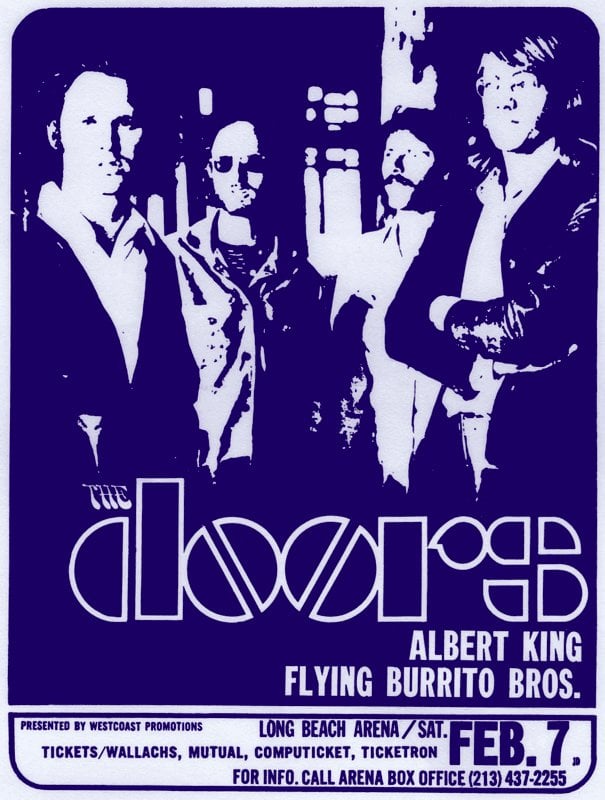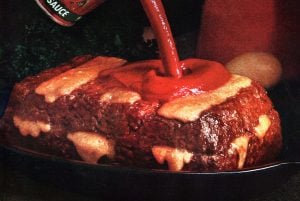The Doors produce drama
By Jeff Cox – The Baltimore Sun (Baltimore, Maryland) September 21, 1967
DRAMA, the kind that grabs your lapels and shoves you against a wall, is being reborn in a thousand clubs, discotheques and halls across America.
It doesn’t use sets, lighting and actors in the usual sense. It does use the rawhide-thong vocal cords of Jim Morrison, lead singer for The Doors. “C’mon baby light my fie-yuh… c’mon baby light my fie-yuh… c’mon baby light my fie-yuuuuuhh!”

When The Doors perform, for instance in The Scene, a catacombs-like New York city club, young people don’t dance. They don’t sing along.
They sit there overwhelmed by the physical beating their ears are getting from The Doors’ forest of amplifiers and the mental train wreck Morrison’s words and actions suggest.

Musical bat
The four of them — Morrison, 24; Ray Manzarek, the organist, 25; Robby Krieger, guitarist, 21; and John Densmore, drummer, 23 — all from the Los Angeles area, want to swing a musical baseball hat at their audiences.
The three musicians, regarded as superior on their instruments, work without much animation. Morrison, however, floats to the microphone, hangs limply on it, looking aside and down, his hair framing a sensitive face.
Then his butterfly hand raises the microphone up, his body goes taut, his eyes look wildly into a personal darkness and he forces his wild voice into the mike. It emerges from the amplifiers turning the room blue with hot, electric thunder.
Then quietly, one hand cupped over his right ear, he begins to sing. It’s theater.

Map of work
“We’re much better in person,” said Morrison, in a cramped room crossed by steampipes behind The Scene’s stage. “Our record album is only a map of our work.”
“Yes,” added Ray Manzarek in clipped, articulate speech, “people become familiar with us through the album, but it’s when they see us that it all happens.”
The Doors want to become even more theatrical. Says Morrison, “I want audiences to feel the same catharsis that the ancient Greeks felt at their plays. In fact, the idea of modern Greek drama is exciting. And, I’d like to use actors, ballet dancers, even animals. I’d like to get animals on stage.

Communication dream
He looks at the floor and says, “I’d like to play in a club where we could be with other people. Maybe we wouldn’t even play. It would be great to sit down and talk with the audience, get rid of all the separate tables, and have one big table.”
The Doors already have realized their dream of communication with the audience. During a performance, the music almost becomes secondary. You stop hearing music and start seeing these musicians as people and ideas.
Ray Manzarek explains this: “Our music short-circuits the conscious mind and allows the subconscious to flow free.”
This happens because their sound transcends music and becomes literary — The Doors are poets, but poets of a dark and close universe.
There’s a special poetry about Morrison’s stance on stage. There’s poetry in the nearly-baroque organ figures that trickle off Manzarek’s fingertips and in the playing of Krieger and Densmore. Their literary tradition is evil, dark and Kafkaesque.
Where the Beatles may be Joycean — humorous and full of puns and childlike spirit — The Doors are deadly serious. They suggest the revolt of the young against hypocrisy, and their songs are poisonous.

Feeling of evil
Their version of “Alabama Song” is typical of this feeling of evil. The song was written by Kurt Weill and Bertolt Brecht in the 1920s. (The Doors, though, write almost all of their own material).
This was the era that produced the psychedelic visions of Nobel Prize author Hermann Hesse in his book “Steppenwolf,” and the tortured paintings of Emil Nolde and George Grosz.
All these men were Germans. Their works were warnings that went unheeded and ended in an Adolf Hitler.
The Doors also are warning people against despotism. To be wild and free is their answer.
“The path of the sun leads to the West,” says Morrison. And to him, the new West is haunted by a moody, young energy.
“There’s a new life out there. New York is decaying. The West is vibrant and strong.”
“It’s a whole new kind of vitality,” adds Manzarek. “You feel closer to the earth when the weather is always warm and you can be sunk in seawater up to your nose in twenty minutes from home.”
The Doors are home in California. “I think we’d like to go to England,” said Morrison.

Melting pot heritage
You wonder if they’ll like England. The Doors are so strictly American — their sound draws on American jazz, rhythm and blues and classical music. Their surnames reveal our melting pot heritage.
“I started out to be a jazz musician,” said Robby Krieger. “But I find rock allows me just as much freedom. American rock is a melting pot of music, too, you know.”
Looking up over his rimless glasses, Manzarek said “Whatever can be said about America can be said about The Doors. We’re electric in every way.”
On fire
It can be said that American youth is on fire with a flame that’s burning away hate and hypocrisy. The same dark and flickering fire burns within The Doors.
And they want to set fire to the world: “Light my fie-yuuuuuhh!”

The Doors, musically, were somewhat ajar (1970)
By Preston Reese – Press-Telegram (Long Beach, California) February 9, 1970
By the time the Doors’ Jim Morrison mounted the Long Beach Arena’s stage Saturday, his audience of 12,000 teenyboppers had already had their young heads blown hither and yon by a series of uppers and downers from the other groups.
The Doors, a hard-rock group, first came into attention three years ago with their hit record “Light My Fire.”
More recently the group was publicized when its lead singer, Jim Morrison, was arrested for “lewd and lascivious behavior” during a Florida concert.
The concert opened with The Flying Burrito Brothers, a group of ex-Byrd members who offered their usual mediocre country-western sampling.
Albert King’s hour-long set followed and brought the audience up with doses of blues-rock, but brought them right back down again when he switched to “heavy” blues, featuring “You’re So Mean To Me.”
King’s technically excellent band had its own cheering squad in what seemed to have been a 90 percent Doors-fan audience, which showed little response to the harsh, beatless type of blues with which he closed his set. The same empty mood prevailed through most of the Doors’ part of the concert, too.

Morrison was in terrible voice, plodding through most of his songs with no attempt at styling or building climaxes.
Although he prodded the audience several times with, “turn out the light!” at the top of his voice during “When the Music’s Over,” he couldn’t seem to recapture this old Morrison style, which at one time took very little trying, which was part of the style itself.
Robby Krieger’s guitar carried a half-hour version of “Light My Fire,” with tight transitions into “Summertime” and various improvised songs by Morrison, who threw in a choppy harmonica solo, which didn’t help the song any, although he was boosted by half the audience, which lighted matches.
Morrison’s repertoire included all the “big ones”… applause-getters which proved themselves years ago, such as, “Soul Kitchen” and “Alabama Song (Whiskey Bar).”

He introduced a couple of new songs which didn’t fare too well, along with “I’m a Spy” and “Gloria,” the latter having hinted the concert might improve after all, but soon it was 11:30 pm, the concert was about to close, and after “When the Music’s Over,” the house lights were up.
Morrison asked: “Does anybody have to be home early?… Turn those lights off, man.” And then he really got into it, with “Love Me Two Times.”
In answering shouts from the audience requesting “Crystal Ship” and “Touch Me,” Morrison asked the audience to decide by applause which one they wanted to hear. “Crystal Ship” won… and bombed.
After the first few lines, Morrison stopped the song when he and guitarist Krieger couldn’t get together.
He did a great job of “Touch Me,” however, and after a minor scrap between he and an audience member, closed the concert at 1 am with “The End.” It was about time.





















One Response
When I was in high school in the early 80s, all the cool kids were obsessed with the Doors, and your wardrobe wasn’t complete without at least one Doors t-shirt. Which was kind of funny as the student body at the time were either toddlers or not yet born when the Doors were in their prime. People would get into sincere, passionate arguments over whether or not Jim Morrison was still alive. Morrison’s biography “No One Here Gets Out Alive” had just been published, and kids who didn’t ready anything else pored over it like it was the Talmud. Overall, anything related to the late Sixties was very cool at my high school — the Stones, the Beatles, Hendrix, the Who, etc. But the Doors and Morrison were the coolest of all. Punk, New Wave, Ska, or anything else that was current at the time? Forget it!